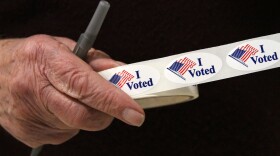Among the people who will soon have a new job as a result of Tuesday’s election is Mark Brave. He’s currently serving as a lieutenant in the Strafford County Sheriff’s Office, but this week he defeated a Republican challenger in the race for the top job in that office. That will make him the first Black sheriff in the state.
He spoke with NHPR's Peter Biello.
Biello: You've been serving in law enforcement for more than a decade in Strafford County. What made you choose this career?
Brave: I didn't choose it. It think it chose me. I originally wanted to be a psychologist in a jail, working with the jail population and special cases in regards to repeat offenders. Why are they coming back? Is it because they need help with social services on the outside to keep them out of trouble? Or was it something else? But when I realized I wasn't getting - I don't know if it was the feedback or the feel of if I was actually making a difference. I had to look for something different, and I found a career in law enforcement.
With respect to your interest in mental health, is that something you're going to bring into this position of sheriff? Is there something you can do to further that goal that you had way back before you even thought of becoming sheriff?
As sheriff, I'm going to begin the conversation on how we can bridge the gap between the social services community and law enforcement.
You've said you want a more community approach. What do you mean by that?
What I mean by that is instead of we, as law enforcement, making decisions, I believe it should be, you know, "Hey, where do you see this problem going in our community?" I feel if we as law enforcement officers speaking to more people dealing with opioid problems, or organizations that help in combating it, we would be further along than we are now.
I want to stay with that example of the opioid crisis when it comes to community policing. What will be different about what you're asking those deputies underneath you to do with respect to the opioid crisis that would embody the spirit of what you're talking about when you talk about community focused approaches to policing?
What I mean by that is, right now the closest we have to a patrol is our civil unit, the unit that goes out and does evictions, paperwork services and whatnot. I'm planning on bolstering their training and basically asking them to slow it down a little bit so when you do go to these calls, they actually can provide, on the scene, not just resources like handing cards out, but actually providing a ride to a clinic if there's a bed open.
Do you have enough resources to slow things down in the way you'd like to so you can have deputies responding to everything in a timely manner and also deputies spending more time with the people who need to have more face to face contact with someone who can help them?
Absolutely not. We definitely don't have the resources and I think that's why we need to come together and think about how we can get those resources. The funding is going to be the big thing. I think it's not going to be, "Okay, what trainings can we put on?" It's going to be the funding, putting on extra staff, police standards and training, certain tools law enforcement might have to have at that point, too, such as the capability to drive to someone to the Cypress Center in Manchester even if they're in Strafford County, because that's the only place with a bed. It's going to take a community approach and funding. We're going to be leaning heavily on our federal officials to try and find the financial resources, and then we won't have any excuses to make it happen, once that happens.
What does being the first Black sheriff in New Hampshire mean to you?
It's very humbling. My parents always said, "Don't let your skin color dictate who you are as a person." So I've always treated people with dignity and respect even though sometimes I've been treated differently. So it's more humbling. And it shows that we here in Strafford County were ready for change and we're open-minded as a community to change. I hope it's motivating to other minorities and other Black young kids like I was in the state of New Hampshire that they can do it. I feel like I'm paving the path for them. Now they can then bridge into other places like, maybe one day we'll have a Black governor in the state of New Hampshire. Maybe we'll have a Black attorney general. Whatever that may be. Now they see it's feasible.








